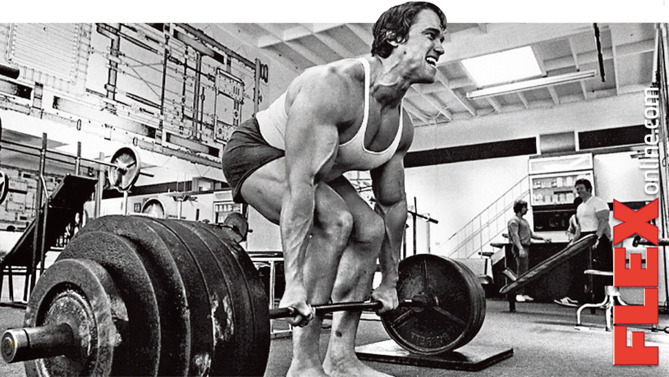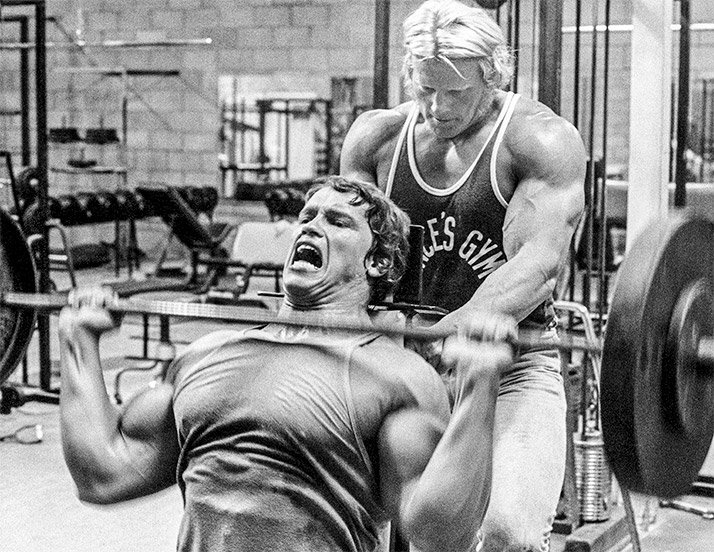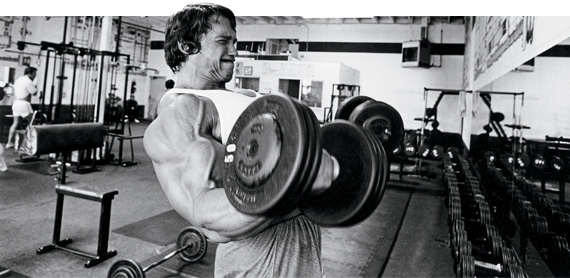Originally Published in This Issue (Muscle Builder & Power, January 1977)
As told to Armand Tanny by Arnold Schwarzenegger.
Sometimes I go to the gym thinking I am going to have a bad workout when, actually, my body is still asleep. During the first few sets the body refuses to cooperate with the mind. I begin to question myself and think maybe I should just quit and forget the whole thing. There's always tomorrow.
However, as often happens, the body starts to warm up quickly. The circuits warm up and begin to conduct, and my calls are getting through to the muscle. I no longer get the dial tone. I get a visual prod, too, when I see some other big animal in the gym pumping iron and pouring sweat, and that stimulates me.
Occasionally I can tell ahead of time if I am going to have a good training session because I get psyched up maybe an hour before. Often, I can't. I may go in thinking I won't get anything out of the workout and end up getting the best workout of my life.
Sometime you get into a situation where you are really overworked, and your body doesn't want to work at all. Then the name of the game is mental power that will determine the outcome of the situation.
Goals are important. How much are you driven by your goals? How important is it for you to complete them? If your drives are strong, your body becomes a willing slave to them.
I enter the gym each day carrying with me my main goal. This is supported day to day by many smaller stimuli. I may change my routine around and do things a bit differently here and there. Like I may have it in my mind that day to do 20 reps with a 315 bench press. The next time I may set a goal of 20 repetition chins, until I can't hold on to the bar anymore. I look forward to these little daily trips.
I like to get into hand-to-hand combat with an exercise. I'll get into a curl-fest with somebody, handing the bar back and forth, non-stop, curling to fatigue with each set until one of us checks out. I find that exciting to both the muscle and the mind. It's important that the exercise doesn't get boring. It must be stimulating in one way or another.
At times I go to the gym thinking I am going to do 60 sets of exercises in one-and-one-half hours. That makes you forget that the muscle is sore or tired.
All those little things help dispel any negative feeling: Am I too tired? Am I in shape? Can I push the weight? Have I eaten too much? Too little? You can't be thinking of those things while you train. You should only be open to hard training and doing your thing in the gym. The worst thing that could happen is showing up on the day of the contest or meet, and then having the thought pop into your mind: "Could I have done more? Maybe I should have done 15 sets instead of 10. Maybe I should have built to more weight on my squats."
Thoughts like that can be miserable, and then of course it's too late. You should have done all those things in the gym already. On the day, you should only be concerned with winning.
When I begin to feel pain during a set of repetitions, my muscle is telling me to stop. I don't stop, OF COURSE, rather, I change this pain to a positive experience. Pain is gain, I tell myself. I am not looking for a way out of the pain. I am humping after it. The important think is to reach the pain and break through it. I am waiting for it to happen so I can then do my repetitions in the pain area. They are the ones that will make the muscle grow. The first few painless reps serve only as a preparation for the main thrust.
After you have reached the point of fatigue with the pain shrieking in your brain, you stop. However, you will stop there only if you are satisfied to place second. If you want to win, you continue your effort into the area of forced reps, paused reps, burns etc., as many as you can. By that time you are vibrating from head to foot, and you have reached the point of exhaustion. There's a distinction between fatigue and exhaustion. At the point of fatigue the muscle is still hiding some of its reserve from you. You've got to take it away with set-extending techniques and go to the point of exhaustion, so then it must fight back with an ever greater compensation.
Muscles are stubborn, and to this day I have never found them submissive. They fight you every time. Their weapon is pain, but once you break through that defense you've got it made.
I set a lot of small goals - 12 reps instead of 8, things like that. They are very important. On a day to day basis the benefits accumulate.
You also have to trick the muscle. For example, my routine calls for one-arm concentration curls at the end of my biceps work. I've already done 15 or 20 sets of other biceps work, and the muscle is tired. Dutifully it does what I tell it to, but with limited energy. Maybe it does, and maybe it doesn't have more energy, but muscles can snow you easily. By always doing concentration curls last I have not given the muscle a fair test. So, what I do sometimes is start my biceps routine with one-arm concentration curls, raising the poundage perhaps 10 pounds more than usual. The muscle reacts well, and my mind has told it that it is capable of handling the heavier poundage. With this conviction locked in me, the biceps will readily respond to the heavier poundage when I again put the concentration curls at the end of my biceps routine. You've got to use every trick possible to make a muscle fully respond at all times regardless of the sequence of the exercises.
The pain barrier may be set up differently for other areas of the body. Things like the biceps and deltoids experience pain before fatigue sets in. Some of the larger muscle groups will cause breathlessness before pain is experienced. For example, when you do squats, you are likely to run out of wind before experiencing any real pain in the leg muscles. You want your legs to be in pain, not your lungs. Therefore, you have to train your legs, slowly adding reps over a period of time, until your legs feel the pain before your lungs.
The same holds true for the lats. When you do any kind of lat pulls, the grip starts to burn before the lats. Your mind is being tricked by your muscles into thinking your lats are exerting full force. Actually the lats have unloaded much of the effort on the arms. You have to look for ways of working up to and breaking through a pain barrier in the lats. How are you going to exhaust the lats?
Take an exercise like the chin-up. Generally it is done with a plain grip, without any aids. The grip gives out if you make any real attempt to break through the pain barrier in the lats. Okay, so what you can do is use hand straps to secure your grip to the bar. The result is an eye-opener for someone who has never tried it. All of a sudden you find a new reserve of power in the lats. You can handle more weight and do more reps. The stress is off the grip. You can feel the pain building up in the lats, and you are in a good position to break through the barrier into the area of extra development.
The same applies to barbell rowing. The hands give out before the lats. Hand straps help transfer the power to the back. You can make a more prolonged effort with more weight, and thus reach the pain barrier in the back muscles where you want it.
I've never had to do anything special for my calves. I can feel the pain build up after several reps, and that's when I really get going. I use a lot of weight on the calf machine. My concentration on my calves is automatic because they have been quick to respond. They pump quick, and I don't have to do that much on them. They are as big as I need them. A single thought, like Reg Park's calves, is sufficient to trick them into a state of exhaustion.
Holding a pose or squeezing the muscle at maximum flexion is a form of peak contraction without weights that improves muscularity. All that squeezing and contracting over a long period of time forces muscles to grow. This can excite muscles or parts of muscles that regular exercises somehow miss. Development becomes more complete.
Bodybuilding is certainly a test of moral fiber. I could never understand why nature instilled in us such a strong resistance to progress. Perhaps it was a way of selecting the best for survival. I do know that I am going to survive in bodybuilding, because when my muscles say 'No', I say 'YES!'.





No comments:
Post a Comment